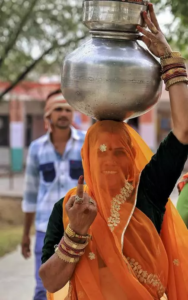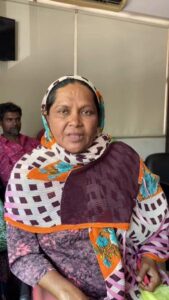November 26 is celebrated as Constitution Day, when rich tributes are paid to the makers of India’s constitution, especially its principal architect B.R. Ambedkar, whose 67th death anniversary is today, December 6, 2023.
Though Baba Saheb Ambedkar, as he is popularly and affectionately known, lived only nine years after Independence, he left an indelible mark on the history of modern India, which inarguably is greater than his contribution during the freedom struggle when he signed the Poona Pact with M.K. Gandhi giving reserved seats to the Dalits after a prolonged struggle. A compromise between him and Gandhi was only the beginning of a new life for a community that had been suppressed for centuries by the obnoxious caste system of the Hindu society.
After India became free, Ambedkar was invited by prime minister Jawaharlal Nehru to join his cabinet and thus became the country’s first law minister. He was amongst the few non-Congress prominent personalities who were inducted into the Nehru cabinet. Others included defence minister Baldev Singh (Akali Dal), Shanmukham Chetty (Justice Party), and Syama Prasad Mukherjee (Hindu Mahasabha). They were opposed to the Congress party during the freedom movement. According to an eminent historian, this was “an extraordinary act of reconciliation for which Gandhi seems to be personally responsible”. Gandhi was reported to have said that freedom had not come to a single party but to all Indians and hence all parties must be given the opportunity for nation-building.
As a cabinet minister, Ambedkar had to be elected to the Constituent Assembly, for which the Congress facilitated his entry into the Assembly from a safe seat in Bombay (now, Mumbai). Earlier, he was elected from Bengal, but with the division of the province after the Mountbatten Plan of June 3, 1947, he ceased to be a member of the Constituent Assembly, as his constituency was allotted to East Bengal (now, Bangladesh).
In her biography, Babsaheb: My Life with Dr. Ambedkar, Savita Ambedkar quotes correspondence between Rajendra Prasad, president of the Constituent Assembly; Jawaharlal Nehru, the prime minister-elect; Sardar Patel, the home minister; G. Mavalankar, speaker; and B.G. Kher, the chief minister of Bombay state to stress that all top Congress leaders were extremely keen to have her husband elected to the Constituent Assembly unopposed.
For instance, Patel wrote to Mavalankar on July 5, 1947, “Dr Ambedkar’s nomination has been sent to PM. I hope there would be no contest, and he would be returned unopposed so that he could come here on the 14th.” Rajendra Prasad similarly wrote earlier on June 30, 1947, to Kher, “I am anxious that he should attend the next session of the Constituent Assembly from the 14th July and it is, therefore, necessary that he should be elected immediately.”
A few months after he became the law minister, Ambedkar was chosen as the chairman of the committee formed to draft the Indian constitution. As chairman of the committee, he had to face criticism from several members of the Assembly whose views didn’t converge with that of the committee, but he handled the enormous task with great skill, tact, and authority.
During the debates, he also delivered brilliant speeches. The following quote from his speech in the Constituent Assembly on November 4, 1948, deserves special mention:
“Another criticism against the Draft Constitution is that no part of it represents the ancient polity of India. It is said that the new Constitution should have been drafted on the ancient Hindu model of a State and that instead of incorporating Western theories the new Constitution should have been raised and built upon village panchayats and district panchayats…… I hold that these village republics have been the ruination of India. I am, therefore, surprised that those who condemn Provincialism and Communalism should come forward as champions of the village. What is the village but a sink of localism, a den of ignorance, narrow-mindedness and communalism? I am glad that the Draft Constitution has discarded the village and adopted the individual as a unit.”
In the same speech, he stated, “Some critics have taken objection to the description of India as a Union of States.. some critics have said the Centre is too strong. Others have said that it must be made stronger. The Draft Constitution has struck a balance.”
However, he warned against the tendency to make the Centre stronger: “It cannot chew more than it can digest. Its strength must be commensurate with its weight. It would be a folly to make it so strong that it may fall by its own weight.”
A day before the constitution was adopted, in his last speech to the Assembly, on November 25, 1949, Ambedkar warned against the cult of Bhakti in politics. He said, “This caution is far more necessary in the case of India than in the case of any other country. For in India, Bhakti, or what may be called the path of devotion or hero-worship, plays a part in its politics, unequalled in magnitude by the part it plays in the politics of any other country in the world. Bhakti in religion may be a road to the salvation of the soul. But in politics, Bhakti or hero-worship is a sure road to degradation and to eventual dictatorship.”
In the same speech, he laid great emphasis on the principle of fraternity which “means a sense of common brotherhood of all Indians… the principle which gives unity and solidarity to social life” Ambedkar also explained why the realisation of the goal of nationhood for India is going to be difficult compared to United States.
“The United States has no caste problem. In India, there are castes. Castes are anti-national, in the first place because they bring about separation in social life. They are anti-national also because they generate jealousy and anty between caste and caste. But we must overcome all these difficulties if we wish to become a nation in reality. For fraternity can be a fact only when there is a nation. Without fraternity, equality and liberty will be no deeper than coats of paint.”
However, what stands out the most in this speech is Ambedkar’s humility. He wanted no credit for himself but gave it to his colleagues. He said,
“The credit that is given to me does not really belong to me. It belongs partly to Sir B.N. Rau, the Constitutional Adviser to the Constituent Assembly who prepared a rough draft of the Constitution for the consideration of the Drafting Committee…. Much greater share of the credit must go to Mr. S.N. Mukherjee, the Chief Draftsman of the Constitution. His ability to put the most intricate proposals in the simplest and clearest legal form can rarely be equalled….I must not omit to mention the members of the staff working under Mr. Mukherjee. For I know how hard they worked and how long they have toiled, sometimes even beyond midnight.”
Ambedkar may have denied himself the credit, but many knew the reality. Rajendra Prasad, the president of the Constituent Assembly, stated:
“I have realised, as nobody else could have, with what zeal the members of the Drafting Committee and especially its Chairman, Dr. Ambedkar, in spite of his indifferent health, have worked. We could never make a decision which was, or could ever be, so right as when we put him on the Drafting Committee and made him its Chairman. He has not only justified his selection but has added lustre to the work which he has done.”
Ambedkar at the end of his life
The Hindu Code Bill was the first revolutionary step towards women’s empowerment in the Nehru era, but its passage in parliament met with several roadblocks despite both prime minister Nehru and law minister Ambedkar were deeply committed to it. It was ultimately passed, but not before Baba Saheb resigned from the Cabinet frustrated by its delay. Savita Ambedkar writes in her book:
“Prime Minister Nehru had just returned from a tour of America when Saheb met him and got from him the approval to table the bill. Nehru assured Saheb that he would get the bill approved…but Speaker Mavalankar, President Dr. Rajendra Prasad and Home Minister Vallabhbhai Patel were openly against it… It was under these difficult circumstances that Doctor Saheb tabled the Bill in the Lok Sabha on 5 Feb 1951.”
But despite the best efforts of Nehru, the Bill could not be passed till the end of September 1951 and Ambedkar submitted his resignation from the Cabinet on September 27, 1951. The Hindu Code Bill was ultimately passed after the general elections in 1952 by breaking it into various sections which took almost the entire period of the first Lok Sabha.
Ambedkar was elected to the Rajya Sabha from Bombay State (now, Maharashtra) in April 1952. But his health started failing following a heart attack in November 1953 while on a train journey from Delhi to Bombay. Though he continued to remain active in public life (for instance in 1954 he addressed the Defence Services College, Willington), he started taking more interest in religious activities.
A decade earlier Nehru had written in The Discovery of India about his attraction to Buddhism for its fight against priestcraft and ritualism as well as for its ethical approach to life. But Ambedkar had one more reason for his preference for Buddhism: the religion had no caste. He wrote a book The Buddha and His Gospel, the title of which was later changed to The Buddha and His Dhamma.
Having lost interest in politics in the evening of his life, and in a state of rapidly deteriorating health, Baba Saheb began preparations for converting to Buddhism. It was on October 14, 1956, less than two months before his death, that a Deeksha ceremony was held at Nagpur, the venue preferred to Mumbai after great deliberation and debate between the Ambedkarites of both the cities. Nearly six lakh followers of Ambedkar embraced Buddhism with their leader, who had vowed way back in 1935, “I was born a Hindu, but I shall not die a Hindu.”
Baba Saheb passed away peacefully in his sleep before dawn on December 6 in Delhi. Amongst the early visitors to his residence to pay their condolences at Alipore Road (now a memorial) were Nehru and many Union ministers, including Babu Jagjivan Ram, who made arrangements for the mortal remains of Ambedkar to be carried to Mumbai. Savita Ambedkar recorded for posterity:
“After Saheb’s passing away, Prime Minister Jawaharlal Nehru offered me a job of a medical officer in a government hospital. In fact, he even showed readiness to take me into the Rajya Sabha, but I turned down the offers. The reason was that Doctor Saheb had made me give up my job after marriage, and I didn’t think it proper to go against his wishes….Later President Sarvepalli Radhakrishnan and Prime Minister Indira Gandhi also showed readiness to get me in the Rajya Sabha but I humbly declined.”
Savita Ambedkar died in 2003 living up to her vow she had taken: “I live as an Ambedkar, and I shall die an Ambedkar.”
(Praveen Davar is an ex-Army officer, a columnist, and the author of ‘Freedom Struggle and Beyond’. Courtesy: The Wire.)




